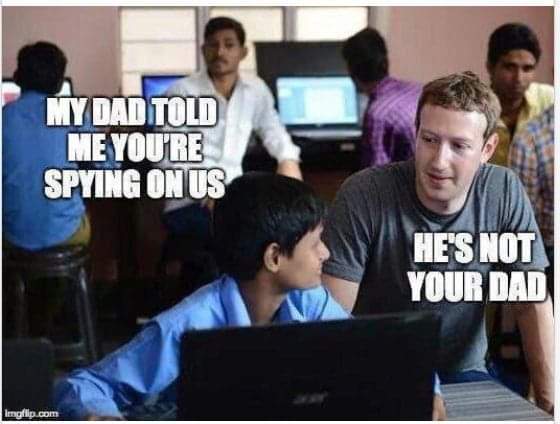These are tense times for the friendly folks at Facebook. Mark Zuckerberg, CEO of the social media dictatorship, has steered his multi-billion dollar corporation into the stormy seas of multiple civil courtroom battles over violating user rights.
There is no question that Facebook is guilty of numerous civil rights violations. The Cambridge Analytics scandal of 2018 caused Facebook shares (FB) to plummet. Subsequent scandals have created a continuous decline in the company’s shareholder value.
But that doesn’t seem to matter to a company which seems to be fueled by higher sources, perhaps related to the federal surveillance state.
CORRECT, they don’t care.
Millie Weaver – Shadowgate Documentary Exposes This as an intentional ‘Ploy’ to restructure data sharing
In a video dated March 9, 2019, PeterOfEngland spoke out in an earnest warning about “the criminal behavior of Facebook, its data collection network, and its working with the United States government – the Pentagon initially – to begin what’s called an ontological data collection point on what’s called ‘designated targets.’”
We the People of the World are the designated targets who were selected by the U.S. government, the CIA, and the Pentagon, according to Peter.
Was it a mere coincidence that on the very same day that Facebook launched – February 4, 2004 – a Pentagon civilian spy project called LifeLog shut down?
The U.S. Defense Advanced Research Projects Agency (DARPA) Pentagon-sponsored Project LifeLog was set up to collect data on all individuals. DARPA functions as the Defense Department’s research branch and is responsible for spending oodles of legally unaccountable taxpayer dollars to conduct Black Operations, secret from public scrutiny.
The data our government was interested in was – and still is – “every conceivable and imaginable platform possible,” said Peter.
LifeLog is “an ontology-based (sub)system that captures, stores, and makes accessible the flow of one person’s experience in and interactions with the world in order to support a broad spectrum of associates/assistants and other system capabilities.”
LifeLog was designed to be an all-encompassing personal data vacuuming system “aimed to gather in a single place just about everything an individual says, sees or does: the phone calls made, the TV shows watched, the magazines read, the plane tickets bought, the e-mail sent and received.”
Why bother with this massive collection of individual citizen’s personal, professional, and social activities, you ask? “Out of this seemingly endless ocean of information, computer scientists would plot distinctive routes in the data, mapping relationships, memories, events and experiences.”
Back in 2004, civil rights activists immediately opposed the surveillance scheme, raising the red flag that LifeLog could be turned against Us the People and “become the ultimate tool for profiling potential enemies of the state.”
The U.S. government responded by shutting down Project LifeLog. Or did they? In February 2004, “Researchers close to the project say they’re not sure why it was dropped late last month. Darpa hasn’t provided an explanation for LifeLog’s quiet cancellation. ‘A change in priorities’ is the only rationale agency spokeswoman Jan Walker gave to Wired News.”
Observers such as PeterOfEngland wonder if LifeLog was replaced by Facebook, which, oddly enough, launched on February 4, 2004 – the very same day DARPA announced the termination of their public surveillance Project LifeLog.
The thinking here is that the determined masterminds at DARPA realized that people might not flock to divulge their personal information to a cold, hard-hearted government agency. But Facebook was warm and inviting: “Sign up for a free account and make Friends” – thumbs up!
The public did flock to Facebook. We were told, in 2004, that the social media platform was the brainchild of a couple of Harvard students (Mark Zuckerberg and Eduardo Saverin) who wanted a face-pic-based school directory to keep in touch with classmates and other associates. The “social networking service launched as FaceMash in July 2003, but later changing to TheFacebook on February 4, 2004.”
Just look at Facebook now! Some people post every intimate detail of their daily lives as well as vital information: name, address, phone, email, web address, family names, veterinarian’s name, etc.
Harvard students made up the initial test base, followed by “other colleges in the Boston area, the Ivy League, and gradually most universities in the United States and Canada, corporations, and by September 2006, to everyone with a valid email address along with an age requirement of being 13 and older.”
Facebook’s growth and social acceptance were nothing short of phenomenal. This makes perfect sense if Facebook is actually a government-sponsored psyop (psychic operation or mind control). It appears, more and more, that this is the case, as Facebook “Community Standards” are suppressing free speech about anything anti-establishmentarian.
Not surprisingly, other world governments and the NSA also got on board with the covert agenda to ease user-friendly Facebook into the role of Global Personal Information Gatherer.
But Facebook got sloppy about user privacy and security concerns and is now staring down the barrel of lawsuits brought by large numbers of angry users whose personal information was abused by the social media spy site.
Perhaps foreshadowing the fate of Facebook, on February 1, 2019, a federal judge in San Francisco ruled that Facebook can be sued for allowing users’ private data to fall into the hands of third-parties such as Cambridge Analytics.
U.S. District Judge Vince Chhabria ruled briefly that “The injury is the disclosure of private information.”
We couldn’t agree more. But will this flagrant violation of civil rights shutter Facebook for good? Only time will tell.
There is one way to shut down Facebook for good. What if they have a social media platform and nobody came?





